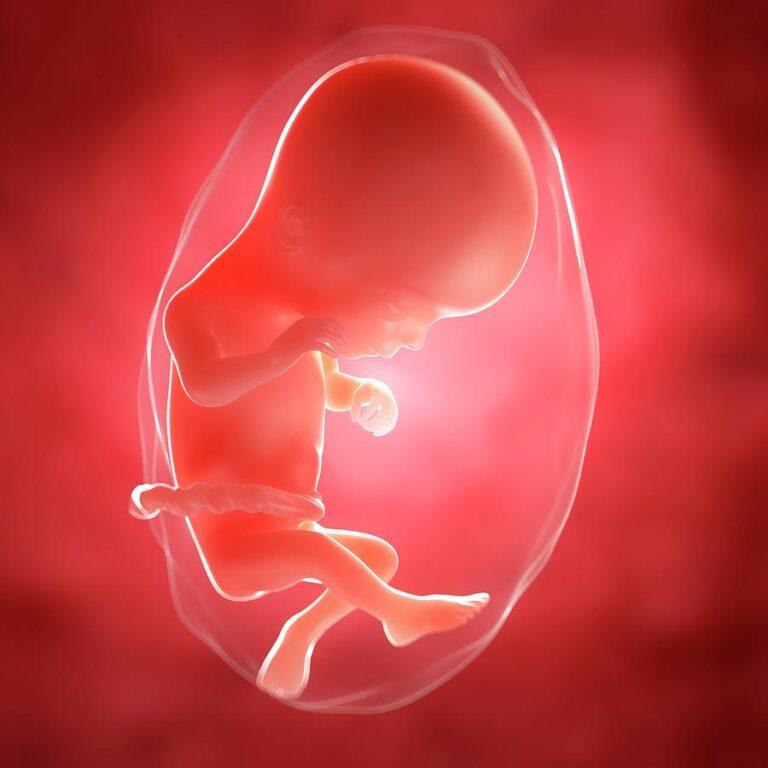16 weeks pregnant: Pregnancy Symptoms & Baby Development
Read time: 4 minutes
16 weeks pregnant is how many months?
Month 4 (Trimester 2)
Baby development at 16 week
Your baby’s moving around more and you may feel light flutters in your belly..
What’s happening in your body?
By week 16, you may have a visible pregnancy bump.
Vitamin D
Why you and your baby need plenty of Vitamin D.
Baby development at 16 weeks

What does my baby look like? And, what size is my baby?
Your baby is now the size of an avocado, and around 11.6cm in length. He or she will weigh around 100g1. The circulatory system is now starting to run, and can pump over 28 litres of blood a day.
Around now, your baby may start flexing their arms and fingers. Their hands may even be able to meet, form a fist, and hold each other2. As your baby’s nervous system continues to develop, their range of movements will also progress2.
Your baby may also be able to recognise your voice. Studies have shown that babies who hear a song while in the womb react to the same song when it’s sung after they’re born. Choose your lullabies wisely.
While they’re beginning to make facial expressions, they can’t control them yet. More importantly, your baby is gearing up for a tremendous growth spurt, more than doubling in weight over the next few weeks.
Pregnancy at 16 weeks (second trimester)
Body changes
You may not be able to hide your pregnancy any more. That said, baby bumps at 16 weeks are different. Some women may not be showing much at all, while others have visible bumps. Everyone’s different, so don’t worry or waste time comparing your belly to anyone else’s.
The extra hormones in your body are also increasing blood flow to your mucus membranes, so you may feel more congested. Don’t be surprised if you experience the occasional nosebleed due to this, too. Saline sprays and nasal strips are safe to help you ease congestion.
Hormones can also cause your veins to stretch. Together with increased blood flow, varicose veins may appear. Don’t worry too much – they shrink after you give birth
Even if your back is aching from carrying a growing baby, after week 16 only lie or exercise on your back for short periods of time as it can cause low blood pressure and dizziness.

Pregnancy symptoms at 16 weeks
By now most mums-to-be are free of the unpleasant pregnancy symptoms of their first trimester. However, there are still uncomfortable symptoms that you can experience at 16 weeks, including:
- Continued breast growth and sensitivity
- Constipation Increased vaginal discharge
- Bleeding gums
- Varicose veins
- Back ache
Focus on Vitamin D
Pregnant women have an increased risk of vitamin D deficiency and need to pay special attention to getting adequate levels. Taking a daily supplement protects your own health, as well as your baby’s.
If you have dark skin, your increased pigment affects your skin’s ability to generate vitamin D, making a daily supplement even more important. Women of South Asian, African, Caribbean and Middle Eastern descent who live in the UK are particularly at risk.
Sunlight creates vitamin D naturally, although take great care not to over-expose yourself to the sun. Between October and April, the body uses reserves left over from summer.

A few foods provide vitamin D, but these are limited. Oily fish, egg yolks and fortified foods are among the few dietary sources. In the UK many people find it difficult to get significant amounts from food alone8.
Because of this, it’s recommended that all pregnant and breastfeeding women take a vitamin D supplement of 10mcg per day. This amount will provide enough for your own needs and help to build the stores your baby needs for the first 6 months of life.
THE
SCIENCE
BEHIND
VITAMIN D
Powered by Nutricia
Your baby is hungry for vitamin D as it’s essential to help bone development by regulating calcium and phosphate in the body. A lack of vitamin D can lead to conditions like rickets in children, and osteomalacia (bone pain) in adults. The good news is that, from early spring to the end of September, you should be able to get plenty of vitamin D from sunlight.
Foods to avoid while pregnant
There’s nothing specific to avoid during individual weeks, but throughout your pregnancy, it’s wise to give the following a miss:
Raw and undercooked meat
Unpasteurised milk and dairy products
Liver, and excessive consumption of foods high in vitamin
